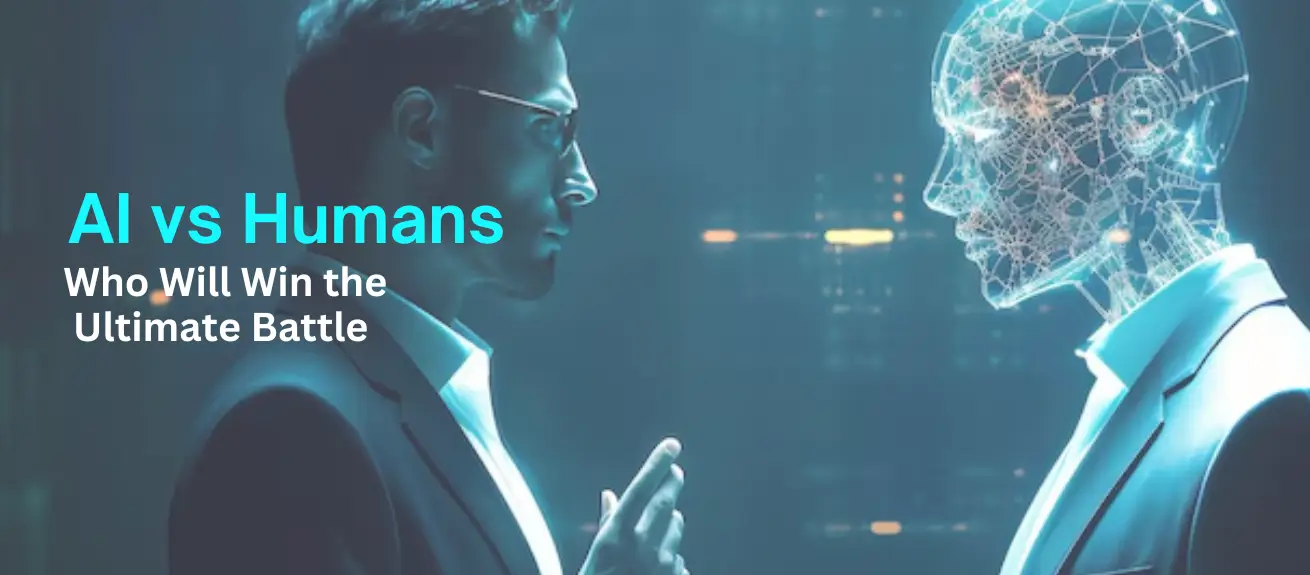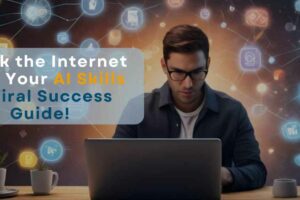
AI vs Humans: The Ultimate Battle in Technology
- Date July 31, 2024
AI vs Humans: Who Will Win the Ultimate Battle?
Imagine you’re sitting in a cozy café, sipping your favorite latte, when you overhear a heated debate next to you. The topic? Whether artificial intelligence will eventually outsmart and replace humans. It’s a scene straight out of a sci-fi movie, right? Well, not quite. This conversation is happening around us, from boardrooms to classrooms, as we grapple with the rapid advancements in AI technology. So, grab your thinking cap, because we’re about to dive deep into this fascinating showdown between silicon and gray matter!
The Rise of Artificial Intelligence
Let’s take a quick trip down memory lane, shall we? The concept of artificial intelligence isn’t as new as you might think. In fact, it’s been kicking around since the 1950s when a bunch of super-smart folks got together and said, “Hey, what if we could make machines think like us?” Fast forward through decades of research, breakthroughs, and the occasional setback (hello, AI winter!), and we’ve arrived at a point where AI is no longer just a far-fetched idea in a researcher’s notebook.
Current AI Capabilities
Now, you might be wondering, “What can AI actually do these days?” Well, hold onto your hats, because the answer might blow you away! From beating world champions at complex games like Go and chess to writing poetry that could make Shakespeare scratch his head in confusion, AI is flexing its digital muscles in ways we never thought possible. It’s diagnosing diseases, predicting weather patterns, and even helping us find our new favorite Netflix show. But before we start bowing down to our robot overlords, let’s remember that humans still have a few tricks up our sleeves.
Human Intelligence: Our Unique Advantage
Here’s where things get interesting. While AI might be able to crunch numbers faster than you can say “algorithm,” it still struggles with the squishy stuff – you know, emotions, empathy, and that spark of creativity that leads to groundbreaking ideas. Ever tried telling a joke to your smartphone’s AI assistant? Yeah, not exactly a laugh riot. Humans have this uncanny ability to read between the lines, pick up on subtle cues, and create art that moves souls. It’s like we have this secret sauce that AI just can’t seem to replicate… yet.
Adaptability and Intuition
Another feather in our human cap is our knack for adapting to new situations and trusting our gut. We can walk into a room, sense the vibe, and adjust our behavior accordingly – all without a single line of code. It’s that je ne sais quoi that makes us uniquely human. AI, on the other hand, needs to be programmed for every possible scenario. It’s like the difference between a jazz musician improvising on stage and a piano player – one can roll with the punches, while the other is stuck playing the same tune.
The Battlegrounds: Where AI and Humans Compete
Alright, let’s talk about the elephant in the room – jobs. It’s the topic that keeps many of us up at night, wondering if we’ll be replaced by a shiny metal counterpart.
Where AI is becoming a very important tool for the jobs its most safe to say that the chances of AI completely taking over all the professions aren’t as much.AI improves efficiency in a job but it cannot replicate the human creative thinking or decision making since it mostly works on whatever instructions are fed to it.
It’s also true that jobs that require you to follow a certain set of instruction are more susceptible to be replaced by AI such as Management consultants and business analysts, Bookkeepers, payroll managers and many such roles.
AI-Human Collaboration
Here’s a plot twist: what if, instead of AI vs. humans, it’s AI and humans? Many experts believe that the future of work lies not in competition, but in collaboration. Imagine AI handling the mundane, repetitive tasks while we humans focus on what we do best – creative problem-solving, strategic thinking, and building relationships. It’s like having a super-smart assistant who never needs coffee breaks!
Such a practice is called Collaborative Intelligence which works by combining human abilities like intuition, judgement and creativity along with AI’s computational powers and data processing skills.
Such a practice is called Collaborative Intelligence which works by combining human abilities like intuition, judgement and creativity along with AI’s computational powers and data processing skills.
Healthcare
Now, let’s talk about an area where the stakes are literally life and death – healthcare. AI is making waves in diagnosis, drug discovery, and even surgical procedures. It can analyze medical images with incredible accuracy and spot patterns in vast amounts of data that might escape the human eye. But here’s the kicker – would you want a robot to deliver bad news or hold your hand during a tough time? The human touch in healthcare is irreplaceable, and that’s where we shine.

It should come as no surprise that artificial intelligence (AI) offers a plethora of options for improving a range of standard medical procedures, from disease diagnosis to determining the most effective course of therapy for patients with life-threatening conditions like cancer. By reducing physical fluctuations and delivering updated information during the procedure, artificial intelligence-equipped robotic surgical technology can assist surgeons in performing procedures more skillfully.
Creative Industries
Ah, the realm of art, music, literature and creativity – surely this is where humans reign supreme, right? Well, it’s complicated. AI can now generate paintings, compose music, and write stories. It’s like we’ve given creativity a digital paintbrush. But here’s the million-dollar question: can AI create art that truly moves us, that captures the human experience in all its messy glory? The jury’s still out on that one, folks.

Effective usage of generative AI still requires human intervention at both the start and finish of the process. To begin with, a generative model cannot generate content without human input in the form of a prompt. Creative prompts typically result in creative outcomes. “Prompt engineer” is going to become a well-known career, at least until the next wave of even more intelligent AI comes along.
After a model generates content, it must then be carefully reviewed and edited by a person.
Ethical Considerations in the AI Era
As AI becomes more integrated into our lives, we’re facing hefty questions about privacy and data security. It’s like we’re building this amazing, all-knowing entity, but we’re not quite sure if we should trust it with our secrets. How much of our personal information are we willing to feed into the AI machine? And who’s making sure it doesn’t fall into the wrong hands? These are the kinds of questions that keep ethicists and policymakers burning the midnight oil.
Algorithmic Bias
Here’s a thorny issue – AI is only as unbiased as the data it’s trained on and the people who create it. And let’s face it, we humans come with our own set of biases. When these biases creep into AI systems, we end up with algorithms that might discriminate based on race, gender, or other factors. It’s like teaching a parrot to talk – if all it hears are curse words, well, you can imagine the result. Addressing this issue is crucial if we want AI to be a force for good rather than a high-tech echo chamber of our worst traits.
The Future of AI and Humanity
So, what does the future hold? Will we be living in a utopia where AI takes care of all our needs, leaving us free to pursue our passions? Or are we headed for a dystopian nightmare where machines rule and humans are obsolete? The truth, as always, probably lies somewhere in between. We might see AI becoming more human-like, with advanced emotional intelligence and creativity. Or we could develop into a symbiotic relationship, where the line between human and machine intelligence blurs.
Preparing for an AI-Driven World
One thing’s for sure – we need to be prepared. This means rethinking education, focusing on skills that complement AI rather than competing with it. We’re talking about creativity, emotional intelligence, and complex problem-solving. It’s like learning to dance with a partner who has infinite stamina and perfect rhythm – we need to up our game!
Conclusion: Coexistence or Conflict?
As we wrap up this whirlwind tour of the AI vs. human showdown, one thing becomes clear – the future isn’t about winning or losing. It’s about finding a balance, a way to coexist and thrive together. AI has the potential to solve some of humanity’s biggest challenges, from climate change to disease. But it needs our human touch – our empathy, our creativity, our moral compass – to truly make a positive impact
Frequently Asked Questions
Welcome to the FAQ section for our blog post on unlocking the secrets of Gen AI and the essential tools required for success. Here are some common questions and answers to help you grasp the essence of this transformative topic:
Will artificial intelligence replace humans?
Not entirely while AI does the work more efficiently and accurately, the mind of human cannot be completely replicated because of our decision-making capabilities and creativeness whereas AI works on a certain set of inputs only.
Can Artificial Intelligence work with humans?
Yes, that is possible with growing times we need to be more creative and efficient, which can be achieved by using Artificial Intelligence where AI would help humans bring more acceptance to their work.
Yes, Artificial Intelligence requires Human supervision therefore jobs like Prompt engineer, AI trainers will be on boom.
Can AI be a self-taught skill?
Yes, many successful AI practitioners are self-taught, leveraging online resources and community support to build their skills.
Can AI develop its own consciousness?
Currently, AI does not possess self-awareness or consciousness. It operates within the parameters set by its creators and the data it’s fed.
You may also like

AI Skills to Break the Internet: Your Guide to Going Viral!

Unveiling AI Strategies of Millionaires

